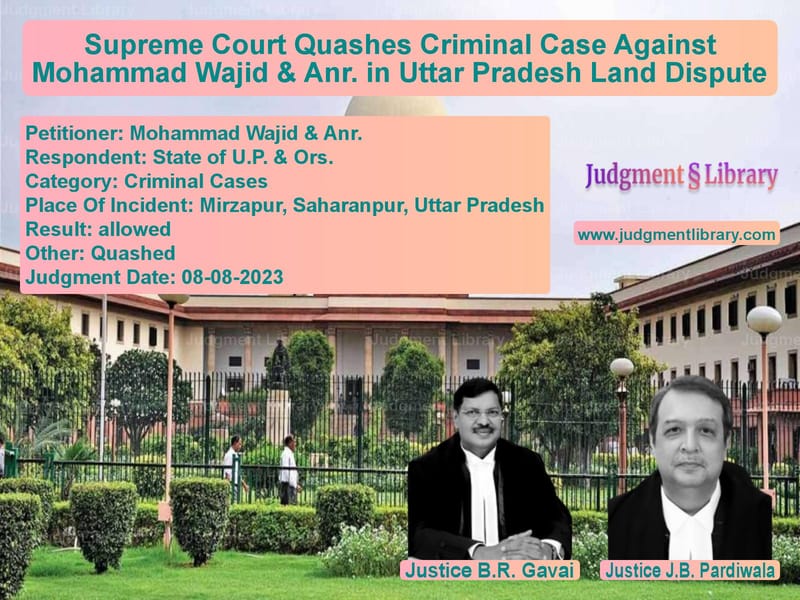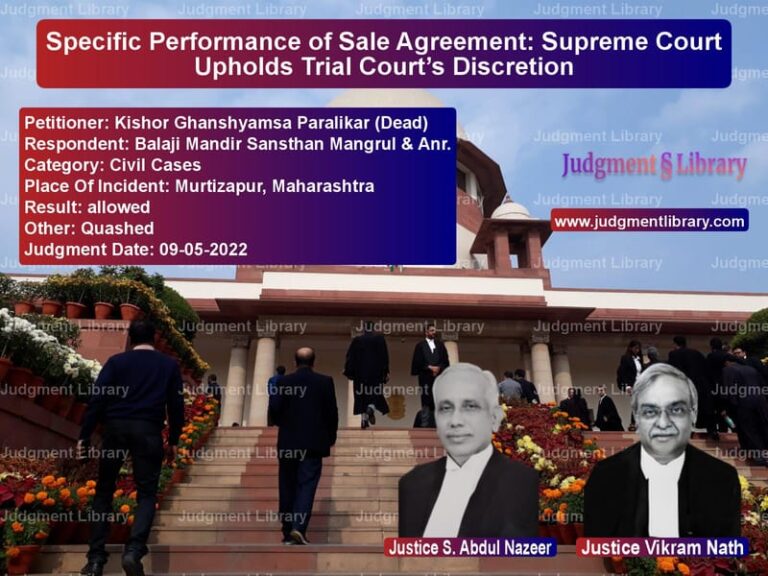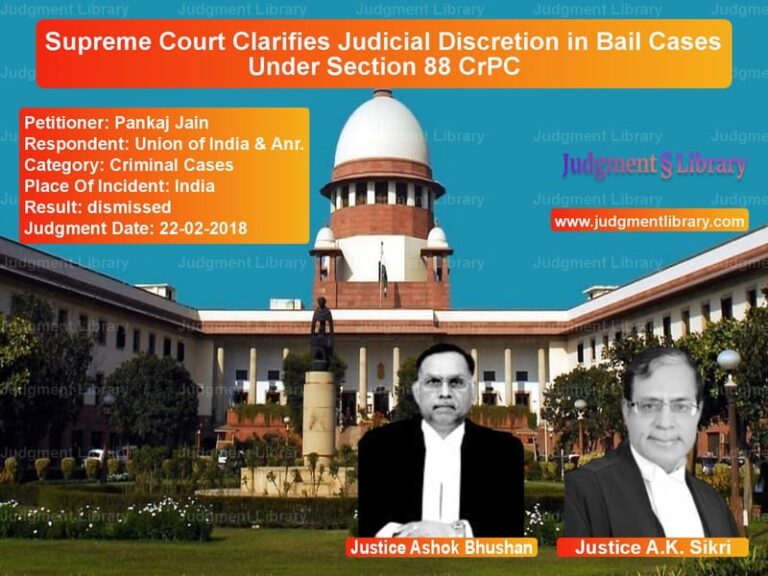Supreme Court Quashes Criminal Case Against Mohammad Wajid & Anr. in Uttar Pradesh Land Dispute
The Supreme Court of India recently ruled in favor of the appellants in the case of Mohammad Wajid & Anr. vs. State of U.P. & Ors., quashing criminal proceedings initiated against them. The judgment, delivered by B.R. Gavai and J.B. Pardiwala, set aside the High Court’s order that had refused to interfere with the FIR against the accused.
The case centered around a long-standing land dispute in Saharanpur, Uttar Pradesh, where the complainant, Ram Kumar, alleged that the accused had forcibly dispossessed him of his land, assaulted him, and extorted money under threat of violence. The Supreme Court examined the merits of the case, including the delay in filing the FIR, inconsistencies in the allegations, and the potential abuse of criminal law.
Background of the Case
The case arose from FIR No. 224 of 2022, lodged at Mirzapur Police Station, District Saharanpur, Uttar Pradesh. The FIR accused Mohammad Wajid, his father Haji Iqbal, and other family members of crimes under:
- Section 395 IPC (Dacoity)
- Section 504 IPC (Intentional insult with intent to provoke breach of peace)
- Section 506 IPC (Criminal intimidation)
- Section 323 IPC (Voluntarily causing hurt)
The complainant, Ram Kumar, alleged that the accused had falsely claimed ownership over his land, assaulted him and his brother, and forced them to sign blank stamp papers under duress.
Chronology of Events
- 2021: Alleged incident involving land dispute and extortion took place.
- September 19, 2022: FIR filed by Ram Kumar.
- October 17, 2022: Allahabad High Court rejected the appellants’ petition to quash the FIR.
- August 8, 2023: Supreme Court quashed the FIR and criminal proceedings.
Petitioner’s Arguments
The accused, represented by Senior Counsel Siddhartha Dave, contended:
- The FIR was fabricated and politically motivated as the complainant delayed filing for over a year.
- There was no independent evidence to support the claim of extortion.
- The complainant never reported the alleged crime to authorities until 2022.
- The allegations were vague and lacked specific dates and times.
- There was no medical report or physical evidence supporting the claim of assault.
Respondent’s Arguments
The State of Uttar Pradesh, represented by Additional Advocate General Garima Prasad, argued:
- The accused were habitual offenders with a long criminal history.
- The delay in lodging the FIR was due to fear and intimidation by the accused.
- The complainant had no motive to falsely implicate the accused.
- The charges were serious, including dacoity and extortion.
- The police had completed their investigation, and a charge sheet was ready for submission.
Supreme Court’s Analysis
The Supreme Court examined the allegations and legal principles, focusing on whether the case met the conditions for quashing under State of Haryana v. Bhajan Lal. The Court found:
“Even if the entire case of the prosecution is believed to be true, the ingredients to constitute the offence of dacoity punishable under Section 395 IPC are not disclosed.”
1. Delay in Filing the FIR
The Court criticized the unexplained delay of over a year in lodging the FIR. It held that delay, coupled with vague allegations, weakened the prosecution’s case.
2. Lack of Specificity in the FIR
The Court found that the FIR lacked key details such as date, time, and independent witnesses to corroborate the allegations.
3. Absence of Physical Evidence
The FIR alleged assault, but no medical report was submitted to substantiate injuries.
4. Political Motivations
The Court noted that multiple FIRs had been filed against the accused, suggesting potential misuse of law for political reasons.
5. Legal Interpretation of Dacoity
The Court emphasized that for an offence under Section 395 IPC (dacoity), five or more persons must commit robbery. The allegations did not support this requirement.
6. Misuse of Criminal Law
Referring to Bhajan Lal’s case, the Court ruled that the FIR was a clear abuse of process:
“The case falls within parameters for quashing as the allegations are inherently improbable and fail to constitute any cognizable offence.”
Final Verdict
The Supreme Court ruled:
- The FIR No. 224 of 2022 and all related proceedings were quashed.
- The High Court’s refusal to quash the FIR was overturned.
- The judgment clarified that politically motivated cases should be scrutinized carefully.
This ruling reinforces the principle that criminal law should not be misused for personal or political vendetta. It upholds the protection of individuals from frivolous litigation while ensuring genuine complaints are addressed under due process.
Petitioner Name: Mohammad Wajid & Anr..Respondent Name: State of U.P. & Ors..Judgment By: Justice B.R. Gavai, Justice J.B. Pardiwala.Place Of Incident: Mirzapur, Saharanpur, Uttar Pradesh.Judgment Date: 08-08-2023.
Don’t miss out on the full details! Download the complete judgment in PDF format below and gain valuable insights instantly!
Download Judgment: mohammad-wajid-&-anr-vs-state-of-u.p.-&-ors.-supreme-court-of-india-judgment-dated-08-08-2023.pdf
Directly Download Judgment: Directly download this Judgment
See all petitions in Fraud and Forgery
See all petitions in Judgment by B R Gavai
See all petitions in Judgment by J.B. Pardiwala
See all petitions in allowed
See all petitions in Quashed
See all petitions in supreme court of India judgments August 2023
See all petitions in 2023 judgments
See all posts in Criminal Cases Category
See all allowed petitions in Criminal Cases Category
See all Dismissed petitions in Criminal Cases Category
See all partially allowed petitions in Criminal Cases Category







